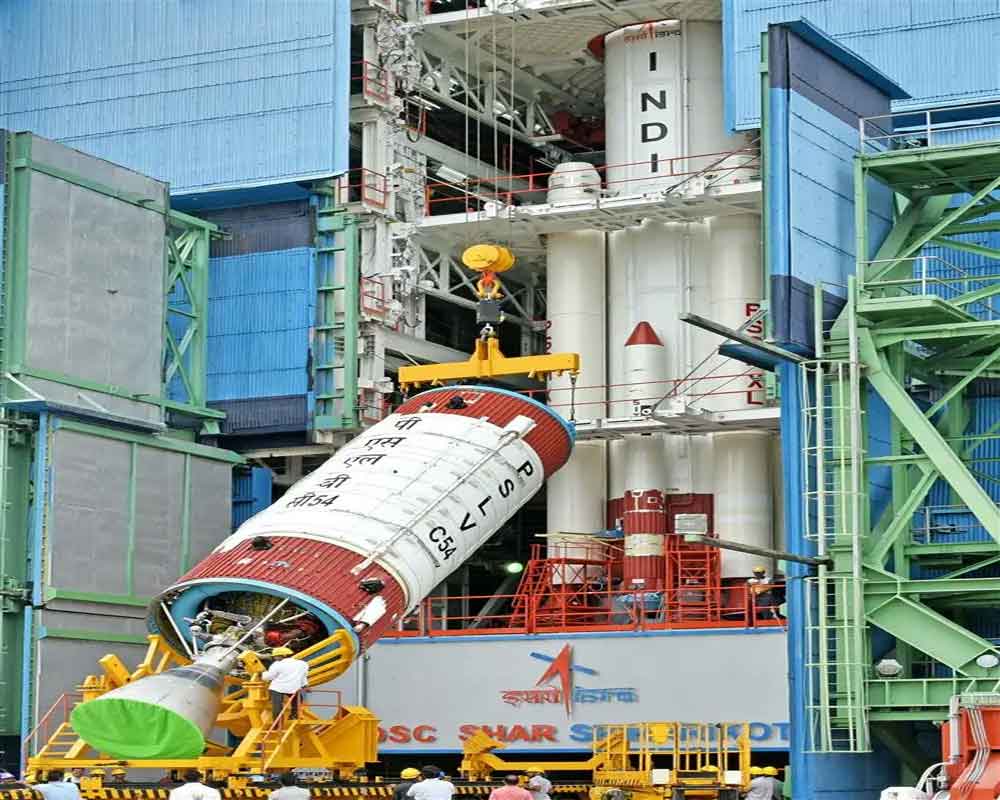Scientists of the Indian Space Research Organisation (ISRO) commenced the countdown for the launch of Earth Observation Satellite – Oceansat – and eight other customer satellites on a PSLV-C54 rocket from the spaceport of Sriharikota.
More About The Development:
The countdown for the 56th flight of the Polar Satellite Launch Vehicle (PSLV), in its extended version (PSLV-XL), from the first launchpad at the Satish Dhawan Space Centre, Sriharikota, 115 km from here.
The primary payload of the rocket is an Oceansat which would be separated in orbit-1 while the eight other nano-satellites would be placed in different orbits based on the customer requirements (in the Sun-synchronous polar orbits).
About This Historic mission:
The mission would be one of the longest ones undertaken by the ISRO scientists who would engage the rocket to change orbits using two-orbit change thrusters (OCTs) used in the PSLV-C54 launch vehicle. The separation of the Earth Observation Satellite is expected to take place in orbit-1 while the passenger payloads would be separated in Orbit-2.
The Earth Observation Satellite is expected to be placed after reaching an altitude of about 742 km about 20 minutes after lift-off.
About The Satellite & Its Objective:
The Earth Observation Satellite-6 is the third-generation satellite in the Oceansat series. This is to provide continuity services of Oceansat-2 spacecraft with enhanced payload specifications as well as application areas.
The objective of the mission is to ensure data continuity of ocean colour and wind vector data to sustain the operational applications.
About The Other Satellites To Be Launched:
The customer payloads include ISRO Nano Satellite-2 for Bhutan (INS-2B) which would have two payloads namely NanoMx and APRS-Digipeater. NanoMx is a multispectral optical imaging payload developed by Space Applications Centre while APRS-Digipeater payload is jointly developed by Department of Information Technology and Telecom, Bhutan, and U R Rao Satellite Centre, Bengaluru.
The ‘Anand’ satellite developed by Pixxel is technology demonstrator to demonstrate the capabilities and commercial applications of miniature earth observation camera for observation using a micro-satellite in low earth orbit.
The ‘Thybolt’ (two satellites) is from another space start-up Dhruva Space while Astrocast is a technology demonstrator satellite for the internet of things as the payload from Spaceflight, the United States of America.
About PSLV-C54 Rocket: PSLV & Its Importance:
The PSLV C54 rocket has four stages; each one was self-contained, with its own propulsion system, thereby capable of functioning independently. The first and third stages used composite solid propellants, while the second and fourth stage use earth-storable liquid propellant.
- PSLV’s first launch was in 1994, and it has been ISRO’s main rocket ever since. Today’s PSLV, however, is vastly improved and several times more powerful than the ones used in the 1990s.
- It is the first Indian launch vehicle to be equipped with liquid stages.
- PSLV is the most reliable rocket used by ISRO till date, with 52 of its 54 flights being successful.
- It successfully launched two spacecraft – Chandrayaan-1 in 2008 and Mars Orbiter Spacecraft in 2013 – that later traveled to Moon and Mars respectively.




 Shivaji Maharaj Jayanti 2026: Why 19 Feb...
Shivaji Maharaj Jayanti 2026: Why 19 Feb...
 Which District of Haryana is known as th...
Which District of Haryana is known as th...
 Top-5 Richest Cities in India by GDP 202...
Top-5 Richest Cities in India by GDP 202...








